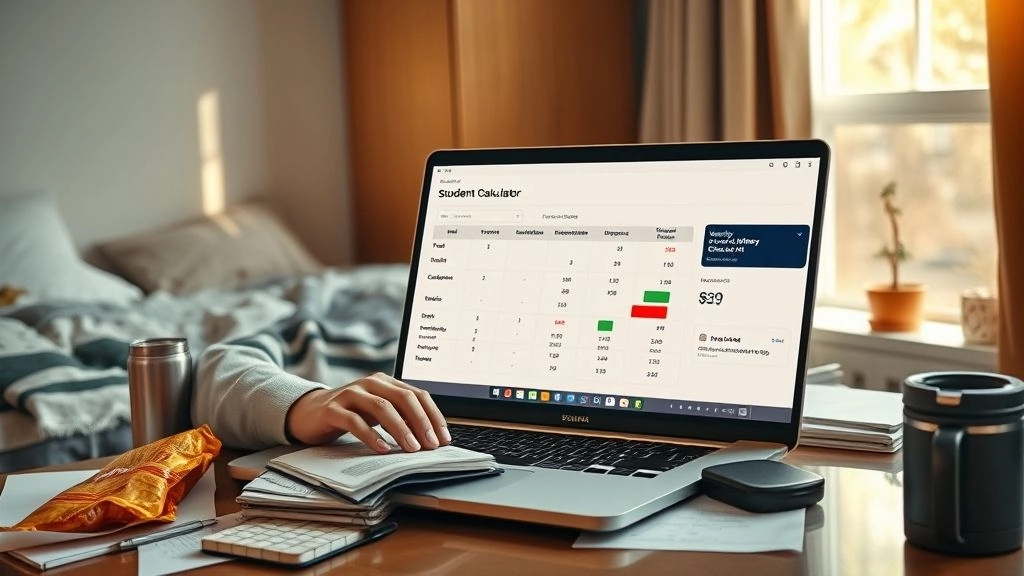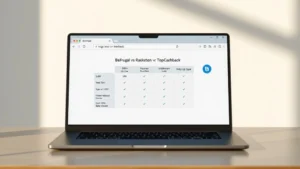Where Does All My Money Go?
Most people don’t realize that you can save this much on college life (like, actual hundreds) just by using a student budget calculator free. Sounds wild, right? You roll up to uni with maybe a little nest egg or a student loan, and then before you know it—you’re texting your mom at the end of the month, freaking out about overdraft fees because… what even happened? Coffee, random textbooks, spontaneous takeout, the bus pass you forget to top up. It adds up.
Let’s be real: budgeting apps and spreadsheets used to feel like homework. But that was before I found out how easy it was with an online calculator. True story: After my first month at university, I was shocked to find out I’d spent more on Uber Eats than groceries. That’s the magic (and embarrassment) a good budget tool can uncover… totally changed my game. And promise, it’s less “mathlete” and more “let’s get you another pizza night.”
The Cash Leak Detector
Ever Wondered Where Your Cash Disappears?
Have you ever sat down and really tried to add up where all your money went last month? Like, really look at it? No judgment—I was the queen of “let’s not check that balance yet.” But once I sucked it up and plugged my numbers into a student budget calculator free, the truth was weirdly… freeing. Spoiler: It’s not just you. Most students overspend without realizing it until it’s almost too late (review of student budget calculators says even the ‘maths whizz’ types struggle sometimes).
Spot the Hidden Leaks
Calculators aren’t just helpful for catching obvious stuff (rent, books). They flag the “small” stuff you ignore—streaming subscriptions, weekly boba, or random late-night snacks that eat up your extra cash without mercy. The best part? They break your year down so you can see your pattern, not just your panic.
Real-Stories Table: Where Does the Money Go?
| Expense | Avg. Cost/year (CIBC) | Avg. Cost/month (RBC) | “My Real Life” |
|---|---|---|---|
| Tuition & fees | $6,693 | — | Matched the ave. (painful!) |
| Books/materials | $1,000 | — | Textbooks: secondhand for the win = ~$300 saved |
| Food | — | $400 | Prepping meals: saves $50+ every month |
| Entertainment | — | $100 | $200+ before I started tracking! |
It’s almost hilarious (and a little tragic) how fast streaming and snack runs can drain your funds when you don’t keep an eye on them.
Finding the Right Tool: Which One Feels Like “You”?
What Makes a Good Companion?
Honestly? If a calculator is ugly or confusing, I can’t be bothered… There, I said it! But the good ones are different. A great student budget calculator free lets you drop in your numbers fast, gives you little nudges (“hey, you spent that much on coffee?”), and doesn’t make you feel broke—just aware.
Some tools on campus or online are shockingly easy. Like, the Pnc student budget calculator is all about speed and simplicity. Pop in tuition, rent, cash from side hustles, and boom—you see your gaps. It’s no-nonsense, the kind of thing you can show your parents (“see, I am adulting!”) without stress.
Top Picks That Don’t Suck
I could give you a giant list…but let’s do favorites, friend to friend:
- Pnc student budget calculator: Clean, fast, lets you estimate all the uni must-haves (even the “optional” coffee budget… cough).
- UCAS budget calculator: Super useful if you’re in the UK, but honestly the mindset and tracker work anywhere—great if you’re comparing living costs between cities or schools. Try the UCAS budget calculator for a slightly more detailed breakdown. Want to see what you’d save by biking to class instead of busing? You can.
- Student budget tracker: If you want to get fancy or do micro-tracking (think: every iced latte, every textbook resale), pair a calculator with the Student budget tracker.
Real Talk: How It Helped Me and My Friends
So, true story—a friend of mine (let’s call him Matt), realized he was overspending on takeout after plugging three months of data into the tracker. The fix? Simple swaps: more homemade pasta, fewer late-night burgers. Saved $75 in one month…enough to get his bike fixed and buy a new hoodie.
I’m also a sucker for low-maintenance. The Student budget tracker is basically “cheat mode”—once you get your categories down, you become suspiciously good at catching the little leaks, and eventually you start seeing a bit of extra cash hanging around after rent and groceries.
Making It Stick: Why Bother Checking In?
Should I Really Check Every Day?
Nope. That’s overkill, unless you’re a spreadsheet nerd (love you anyway). Once a week is the sweet spot. Treat it like a tiny financial check-in, like looking for new memes—but it’s your money instead.
How to Stay Motivated (and Sane)
Use reminders, rewards, or even silly competitions with your roommates (“who spent least on coffee this week?”). I started adding GIFs and emojis to my tracker notes—if I cooked instead of ordering out, I get a little pizza emoji.
Budget Tracker Tweaks for Real Life
Let’s be honest: sometimes you’ll overspend. That’s life. The magic is catching it early! Here’s a trick: schedule a 10-minute “weekly money date” with yourself (music, snacks, comfy chair). Use your Pnc student budget calculator or whatever tool you like, see where your money went, and pick one small thing for next week (like, skip one fast food splurge).
| Tool | How Often to Use | What It’s Good For |
|---|---|---|
| Pnc student budget calculator | Monthly/Each Semester | Quick, big picture snapshot |
| Student budget tracker | Weekly | Detailed spending patterns |
| UCAS budget calculator | Start of year, or when moving | Comparing schools/locations |
I swear—after just a few weeks of budgeting, you’ll notice you have a lot less “where did my money go?” and a lot more “hey, I can actually afford movie night without guilt.”
Practical Tweaks: Everyday Ways to Stretch Your Budget
Can You Really Save Without Missing Out?
Yes—you don’t have to live on instant noodles. Think of budgeting like being the sneaky mastermind behind your own savings. You’re not cutting out all the fun, you’re just making your money do some actual heavy lifting. Little swaps go a long way (homemade iced coffee for $0.50 instead of $5 at the cafe? Yes please!).
Dealing With Loans and Side Hustles
Loans can feel like a huge shadow (“hello, student debt monster”). But if you plan ahead with a student budget calculator free, you can figure out how much you really need to borrow—no more, no less. Playing with a calculator for “what if I work 10 extra hours this month?” is low-key addicting. Of course, you can always tap into the UCAS budget calculator for help thinking through what those bigger decisions do to your bottom line.
Heads up: If loans are part of life, it’s worth checking a Bankrate student loans calculator to see what repayment could look like after graduation. Sometimes seeing those numbers now is exactly the wake-up call you need (“wait… my future self is gonna pay what each month?”).
Examples: The Little Stuff Adds Up (And Fast!)
I used the CIBC and RBC calculators when I first moved off-campus. Turns out, just walking instead of taking the bus for a month saved enough for a splurge on new headphones. Another friend used the Student budget tracker to realize she was dropping way too much on weekend trips out—so she organized movie nights in, and guess what? Same fun, half the cost.
Comparison Table: Free vs Paid Tools—Is Paid Really Better?
| Feature | Free Tools (e.g., UCAS/CIBC/PNC) | Paid Apps (YNAB, etc.) |
|---|---|---|
| Cost | Zero | $50+/year |
| Setup | Easy, quick | Can be more complex |
| Insights | Great, but basic | Deeper analytics, automatic syncing |
| Portability | Mostly web-based, some with export | Mobile apps & web, fully synced |
If you just want to keep it simple, free is perfect. Paid can help if you want charts and auto-syncing…but a free student budget calculator gives you 90% of what you need to win the money game.
Let’s Wrap This Up—And Start Saving
Whew, okay, deep breath—we’ve covered a lot, but honestly, using a student budget calculator free is way less intimidating than you think. It’s like having a “grownup” cheat code, letting you spot sneaky drains and unlocking extra savings just by knowing what’s up. Skip the guilt, skip the panic… embrace the awkward glance at your expenses and then take control, bit by bit.
Pick your favorite tool (the Pnc student budget calculator for speed, the Student budget tracker for the details, the UCAS budget calculator for planning something big). Start small—a week, a month, a single dollar you used to blow on snacks. You don’t need to be perfect; just curious. Try a money date, drop your “a-ha!” moments in a tracker, and celebrate your first surplus, even if it’s only $20.
Your future self might just look back and wonder, “How did I ever live without this?” (And who knows, you might even have enough leftover for that extra-pineapple pizza). Give it a shot, let the numbers surprise you, and write your own “how I saved way more than I ever thought possible” story. You got this, friend.













